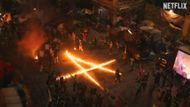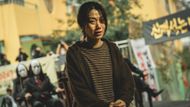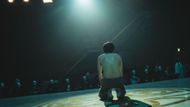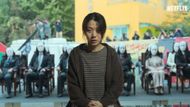Hellbound is a South Korean supernatural dark fantasy thriller TV series on Netflix, written and directed by Yeon Sang-ho, with Choi Gyu-seok co-writing the script. The show is based on their webtoon of the same name. The series explores what happens when fear and belief replace legal systems.
Throughout both seasons, Hellbound offers powerful moments that raise important questions about fairness, authority, and the role of institutions. Hellbound takes place in the future, specifically in 2022, when supernatural beings suddenly appear to condemn people to Hell.
The story is more than a supernatural thriller; it reflects society's views on justice. The plot takes place in a world where people get divine messages announcing their death. These scenes illustrate how easily the lines between justice and spectacle can blur. Through unsettling events, the show encourages viewers to rethink the strength, purpose, and vulnerability of our judicial systems.
Disclaimer: This article is based solely on the writer's opinion. Reader discretion is advised.
Here is the list of the 7 Moments from Hellbound that will make you think twice about the judicial system
7. Fragmented authority and societal breakdown moment

In season 2 of Hellbound, South Korea falls into chaos. We saw three groups compete for control: the New Truth Society, the Arrowhead cult, and Sodo. The group protects those facing condemnation. The fragmentation of the legal system ultimately results in its disintegration, and public confidence in institutions diminishes, leading each faction to assume the roles of both judge and executioner.
The government secretly manipulates both sides to keep control. Civilians can no longer rely on the police or courts. In this turmoil, ritual deaths replace trials, and followers enforce divine judgments. This situation made me rethink our justice system. It shows how easily authority can break down when fear takes over.
If people view laws as inadequate or corrupt, they may turn to extremist groups for justice. Society then splits into hostile factions, making courts ineffective. Hellbound highlights the risks of a legal breakdown when religion or propaganda overrides reason or law. It warns that a functioning judiciary relies on shared trust: Once that trust fades, violence and superstition prevail.
6. Resurrection of Park Jeong-ja

In Episode 1 of Season 2, Park Jeong-ja mysteriously wakes up alive years after her execution. As they build a new worldview around her, viewers realize that the New Truth Society conceals her. The government’s Senior Secretary Lee uses her to promote this belief system.
This scene from Hellbound challenges my views on judicial processes. A person judged guilty and executed now returns. It illustrates that supernatural forces can override any trial or judgment. A human court was never part of the process, and due process is absent.
The system fails when justice is defined as "divine decree," and human law becomes irrelevant. This resurrection shows how quickly legal systems can be disregarded if society submits to a higher or supernatural authority. It warns how easily institutions can crumble when people replace faith in the law with fear and miracles.
5. Newborn's decree and moral collapse

In Episode 6 of Season 1, a newborn named 'Toughie' receives a death decree immediately after birth. Her parents, Youngjae and Sohyun, along with lawyer Min Hye‑jin and Sodo, try to livestream her execution to expose the New Truth. They fight against the executioners, and the parents sacrifice themselves to save the baby. Against all odds, the baby survives.
This moment from Hellbound is shocking because the condemned is an innocent infant. It highlights the absurdity of the judicial system when divine judgment extends to babies. There is no court, no crime, no chance. Even though original sin has been rejected, the decree treats it as real. This moral weakness causes one to reevaluate justice when belief trumps evidence.
A legal system should rely on proof and fairness, not fear-driven decrees. Here, the system vanishes, replaced by religious spectacle. It illustrates the difficulty of judicial ethics when deeply held religious convictions go beyond what is lawful.
4. Sodo's secret sanctuary

In Episodes 5 and 6 of Season 1, Sodo appears as a secret group that protects people receiving death decrees. They aim to shield these individuals from public executions and cult hysteria, and operate outside the established system, creating safe spaces and providing covert assistance. Sodo sees decrees as random tragedies, not divine punishments. They challenge the authority of the New Truth.
This situation complicates the judicial system because Sodo acts as a substitute for justice. When courts fail or side with extremists, a private group takes legal authority into its own hands, deciding who deserves protection. This shows how justice can collapse if institutions lose their legitimacy. The law becomes insignificant, replaced by secret justice.
Hellbound warns that if society allows unofficial groups to protect or condemn individuals, the state court system becomes ineffective. It stresses that justice needs transparency, fairness, and trust.
3. Min Hye-jin's DoXXing and mother's death

In Season 1 Episode 3, lawyer Min Hye-jin defends Park Jung-ja, a single mother marked for Hell. She is threatened for helping Jung-ja since she is being followed by Arrowhead extremist cult members. They vandalize her law office, assault her colleagues, and violently attack her sick, elderly mother in a parking lot. Her mother later died in the hospital.
This moment shows how severely the judicial system can fail. Min Hye-jin tries to use the law to protect Jung-ja and her children, but she becomes a target herself. Violent followers take justice into their own hands, punishing someone for simply doing her job.
Watching someone die not because of a legal decision but out of mob hatred makes you question the strength of our courts. In Hellbound, the law does not protect those who enforce it. Thus, this TV series reveals how weak legal systems can become when fear and extremism replace reason.
2. Corruption within the police

In the second and third episodes of Season 1, Detective Jin Kyung-hun investigates the supernatural decrees. As the story unfolds, he discovers that his partner, Eunpyo, secretly supports the Arrowhead cult. Eunpyo leaks the identities of people facing condemnation to incite public outrage. Meanwhile, the cult manipulates police cooperation.
At one point, the detective finds proof that cult leader Jung Jin-soo planned a murder, using the detective's daughter to kill the man who murdered his wife, making it look like divine judgment. Yet, Jin Kyung-hun does not reveal this truth. He fears it will destabilize society.
This corruption from Hellbound shows how the justice system can be twisted from within. If police officers follow extremist beliefs instead of the law, innocent people suffer even without trials. The show prompts you to realize that a legal system is only as fair as those who enforce it. When those enforcers are compromised, verdicts lose their meaning, and the law can end up protecting tyranny.
1. Park Jeong-ja's public condemnation

Viewers see Park Jeong-ja, a single mother, receive a decree stating that she will be taken to Hell in five days. The New Truth offers to pay her and livestream her death as a public spectacle. Hesitantly, she agrees to secure money for her children.
In episode 3, the execution is broadcast, with media and masked VIP viewers in attendance. The execution monsters appear while the audience watches, captivated. Violent hysteria grips the communities while the police mainly stand by as the crowd cheers. Park Jeong-ja dies before the public, not in court.
This moment in Hellbound made me rethink the judiciary. A judgment that should rely on evidence and trial turns into entertainment and ritual. Human courts disappear, replaced by performance and fear. Hellbound warns that when public spectacle replaces due process, justice loses its meaning, and people die simply for being labeled "sinner."
We concluded that Hellbound used its supernatural backdrop to highlight the flaws in real-world justice systems. Each moment, from public executions to police corruption, showed how fragile legal systems can become when influenced by fear, belief, or social pressure.
This television show emphasizes how the government's contempt for the law and people's rights harms justice. It shows that when authority figures twist the truth and procedures become mere formalities, the whole system breaks down.
In Hellbound, the collapse of law and order feels disturbingly real, pushing us to reflect on how we uphold justice in our world.
